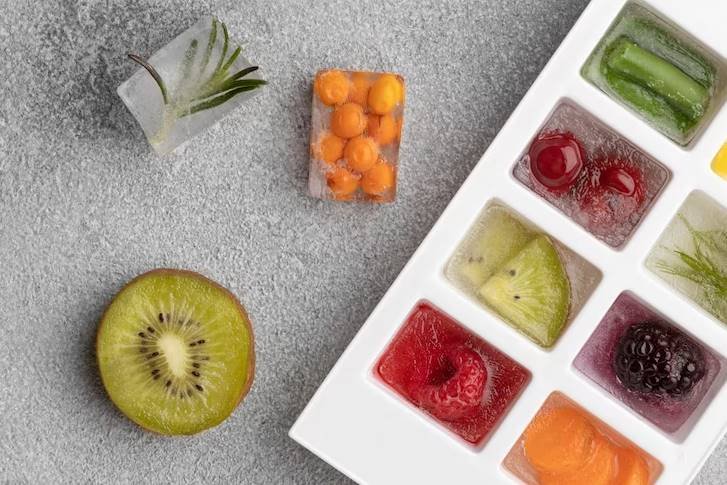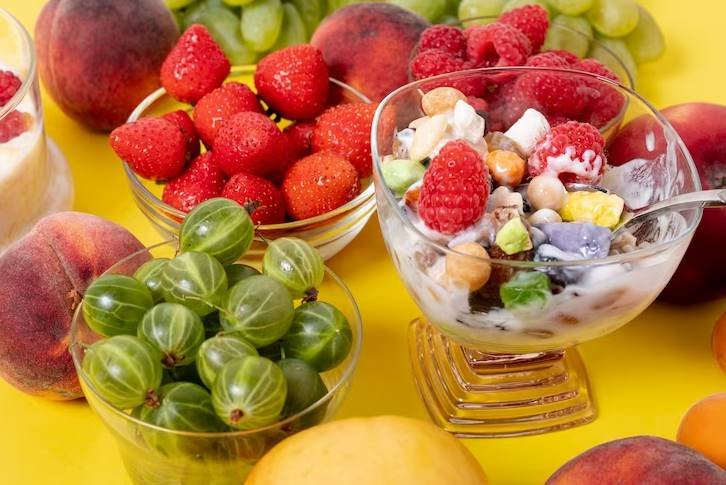As an experienced nutritionist, I can tell you that understanding the shelf life of frozen fruits isn’t just about dates on a package. It’s about knowing the factors that influence how well your fruits preserve, and how their quality can change over time. This knowledge will not only save you money but also ensure you’re consuming products that are both safe and delicious.
So, how long do frozen fruits last? Frozen fruits can generally last between 6 to 9 months if they are kept constantly frozen. However, some factors such as freezer temperature, type of fruit, and packaging can impact this duration. For instance, fruits may last up to 18 months or even indefinitely under certain conditions. But what are these conditions? And how can you maximize the lifespan of your frozen fruits? Let’s delve into the details and uncover these crucial insights. Read on to become a master of your freezer!
What Determines the Shelf Life of Frozen Fruits?
When it comes to the shelf life of frozen fruits, several factors play a crucial role. It’s not just about how long the fruit has been in the freezer but also about the quality of the fruit at the time of freezing, the temperature of your freezer, and the packaging used. The way these factors interact can significantly impact how long your frozen fruits maintain their flavor, texture, and nutritional value.

The quality of the fruit before freezing is fundamental. Fresh, ripe fruits that are quickly frozen after harvest will have a longer shelf life compared to overripe or bruised fruits. The freezing process essentially “pauses” the fruit’s natural aging and ripening process, preserving its current state. So, if the fruit is in good condition when frozen, it will last longer.
According to a study by the National Center for Home Food Preservation, frozen fruits maintained at 0°F or lower can be kept indefinitely from a safety standpoint. However, the quality declines after about a year. This research highlights the importance of maintaining a consistent, low temperature in your freezer to extend the shelf life of your frozen fruits.
The Impact of Freezer Temperature on Frozen Fruit Longevity
The temperature of your freezer is a critical determinant in the longevity of your frozen fruits. A consistent, adequately low temperature helps to preserve the quality and nutritional value of the fruits over a longer period. This is because lower temperatures slow down the enzymatic reactions that usually cause food spoilage.
However, not all freezers are created equal, and variations in temperature can occur. Fluctuations in freezer temperature can lead to a phenomenon known as “freeze-thaw cycles”. These cycles occur when the temperature rises enough for the ice crystals in the fruit to partially melt, then refreezes when the temperature drops. These freeze-thaw cycles can degrade the texture and flavor of the fruit, shortening its shelf life.
According to the USDA, the ideal freezer temperature for preserving food, including frozen fruits, is 0°F or below. At this temperature, bacteria, yeasts, and molds are inactive, thus prolonging the life of the fruit. However, maintaining a consistent temperature can be challenging, especially in older models of freezers or when the freezer door is frequently opened. Therefore, investing in a good quality freezer and minimizing the opening of the freezer door can significantly enhance the lifespan of your frozen fruits.
Can You Eat 2-Year-Old Frozen Fruit? Unveiling the Truth
The question of whether you can eat 2-year-old frozen fruit is not uncommon, especially for those who like to stock up on seasonal fruits. The good news is, from a safety standpoint, you can indeed eat frozen fruit that’s been in the freezer for two years or even longer. This is because freezing inhibits the growth of microorganisms that cause food spoilage and illness.
However, while it’s safe to consume, the quality of the fruit after such a long time in the freezer may be compromised. Over time, the texture, taste, and nutritional value of the fruit can degrade due to factors like freezer burn and freeze-thaw cycles. So, while your 2-year-old frozen fruit might not make you sick, it may not be as tasty or nutritious as fresher frozen fruit.

According to the U.S. Food and Drug Administration, frozen foods remain safe indefinitely. But for the best quality, they recommend consuming frozen fruits within 8 to 12 months of freezing. Therefore, while it’s not harmful to eat 2-year-old frozen fruit, for an optimal eating experience, it’s best to consume frozen fruits within a year of their freezing date.
How to Extend the Life of Your Frozen Fruits
Extending the life of your frozen fruits primarily requires proper freezing techniques and storage methods. When done correctly, these strategies can help maintain the quality and nutritional value of your fruits, keeping them fresh and flavorful for longer.
Here are some practical steps you can follow:
- Choose Fresh and Ripe Fruits: The quality of the fruit at the time of freezing significantly impacts its shelf life. Always choose fresh, ripe fruits for freezing.
- Prep Your Fruits Properly: Wash your fruits thoroughly, remove any bruised or damaged parts, and cut them into uniform sizes for even freezing.
- Blanch Fruits When Necessary: Some fruits, like peaches and apples, benefit from blanching before freezing. This process helps preserve color, flavor, and nutritional value.
- Use Suitable Packaging: Use airtight containers or freezer bags to store your fruits. Remove as much air as possible to prevent freezer burn.
- Maintain Optimal Freezer Temperature: Keep your freezer temperature at 0°F (-18°C) or below for the best results. Regularly check and adjust the temperature as needed.
- Rotate Your Stock: Use the “first in, first out” principle. Use older batches before newer ones to ensure none of your fruits stay in the freezer for too long.
By following these steps, you can extend the life of your frozen fruits, making sure they remain safe and tasty to eat for many months, or even years, after freezing. Remember that while freezing preserves the safety of the fruit indefinitely, quality does degrade over time, so it’s always best to consume frozen fruits within a year for optimal taste and nutrition.
The Truth About Freezer Burn and Its Effects on Frozen Fruit
Freezer burn might sound like a dramatic term, but it’s essentially a common phenomenon that occurs when food is exposed to air in the freezer. This exposure leads to dehydration and oxidation, which can affect the color, texture, and taste of your frozen fruit.
But what does freezer burn look like? If your fruit has freezer burn, you’ll likely notice dry, grayish-brown patches on the surface. This happens when water molecules in the fruit migrate to the coldest part of the freezer (usually the walls) and then evaporate, leaving behind dehydrated areas. Although this process doesn’t make the fruit unsafe to eat, it does degrade the quality, leading to a tough texture and bland or off-flavors.
To avoid freezer burn, it’s crucial to pack your fruits properly before freezing them. Using airtight containers or heavy-duty freezer bags can help prevent air exposure. Also, try to freeze fruits in small batches to reduce the amount of time they spend at room temperature during defrosting. By following these steps, you can limit the risk of freezer burn and ensure your frozen fruits maintain their quality for as long as possible.

The Indefinite Safety of Solidly Frozen Fruit Packs
A common misconception is that frozen fruits lose their safety over time. However, the truth is quite the opposite. When properly stored, solidly frozen fruit packs can remain safe to consume indefinitely. The freezing process halts the growth of microorganisms that cause food spoilage and illness, essentially putting a “pause” on the fruit’s aging process.
Yet, it is important to note that while the safety of the fruit is maintained, the quality in terms of flavor, texture, and nutritional value may degrade over time. This degradation is due to factors such as freezer burn, freeze-thaw cycles, and the natural enzymatic processes in the fruit. Therefore, while your frozen fruits won’t become unsafe to eat, they might not be as enjoyable or nutritious after an extended period in the freezer.
In conclusion, solidly frozen fruit packs are safe to consume indefinitely, provided they have been stored correctly. However, for the best quality, it’s recommended to consume frozen fruits within 8 to 12 months of freezing. This ensures you’re enjoying them at their peak flavor and nutritional value.
How Long Does Mixed Frozen Fruit Last?
Mixed frozen fruit is a convenient option for many people, providing an easy way to incorporate a variety of fruits into your diet. When properly stored, mixed frozen fruit can last for an extended period in the freezer without losing its safety. However, like individual frozen fruits, the quality in terms of taste, texture, and nutritional value may start to decline after a certain period.
The shelf life of mixed frozen fruit depends on several factors, including the quality of the fruits at the time of freezing, the temperature of the freezer, and the packaging used. If these factors are optimal, mixed frozen fruit can maintain good quality for about 8 to 12 months. After this period, while it will still be safe to eat, the quality may begin to degrade.
According to the U.S. Food and Drug Administration (FDA), frozen foods remain safe indefinitely as long as they have been kept consistently at 0°F or below. But for the best quality, they recommend consuming frozen fruits, including mixed fruits, within 8 to 12 months of freezing. Therefore, while you can safely consume mixed frozen fruit beyond this period, it’s best to do so within a year for optimal taste and nutrition.
To Wrap Up
The world of frozen fruit is indeed fascinating, offering convenience, longevity, and a way to enjoy your favorite fruits all year round. Remember, while the safety of frozen fruit is indefinite, its quality in terms of taste, texture, and nutritional value can degrade over time. However, with proper storage techniques, optimal freezer temperatures, and by consuming within the recommended timeframe, you can enjoy the peak flavor and nutrition of your frozen fruits.
So, don’t let the fear of freezer burn or shelf life hold you back. Embrace the frozen aisle and stock up on your favorite fruits. With every bite, remember that you’re not just enjoying a tasty treat, but you’re also taking a step towards a healthier lifestyle. Now, isn’t that something to smile about?
Frequently Asked Questions
How long does frozen fruit last in the freezer?
Is it safe to eat frozen fruit that's been in the freezer for over a year?
What is freezer burn and how does it affect frozen fruit?
How can I prevent freezer burn on frozen fruit?
Can I extend the life of my frozen fruits?





















